Posted October 20, 2023 by Nicky in Reviews / 2 Comments

The Mummy Case Mystery
Genres: Crime,
Mystery Pages: 230
Rating: 
Synopsis: The Commemoration Night ball at Beaufort College, Oxford, is disturbed first by a strange prank with a professor's mummy, then by a tragic fire that kills the professor-or did it? If he died in the fire, what happened to the mummy? Professors Sargent and Considine take it upon themselves to investigate when the coroner rules accidental death, leaving them with unanswered questions.
I read about this book in Martin Edwards’ book on classic crime, and thought it sounded pretty awesome, so I tracked down a copy. In the UK they’re stupidly expensive, but AbeBooks solved that problem.
The book is very much an Oxford mystery: the first few chapters are just completely redolent of nostalgia and love for Oxford. It’s very similar in feel to Gaudy Night, and I’d be surprised if Dermot Morrah wasn’t an alumnus. (There’s a touch of romance here, but only the very lightest touch: no placet ne, magistra? here, and no chance of it either. It’s not anti-women but it’s not particularly positive about them either, though at least one character’s views on women in education are rather shown up.)
The mystery is entertaining enough, and I cottoned on to significant parts of it — not all, but most. Don’t be fooled by the title, in any case: the Egyptian stuff is mere trappings, though the mummy case is important in its way. Oxford is the real star.
I found it enjoyable, but a little slow and convoluted.
Tags: book reviews, books, crime, Dermot Morrah, mystery
Posted September 19, 2023 by Nicky in Reviews / 0 Comments
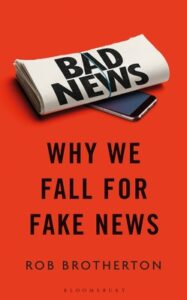 Bad News: Why We Fall for Fake News, Rob Brotherton
Bad News: Why We Fall for Fake News, Rob Brotherton
Bad News is surprisingly full of good news, in fact. Although the subtitle makes it sound like this is all about “fake news”, that’s not quite the truth. The book focuses on the news in general, reasoning that to understand the problem of fake news, you must first understand what the news is and what we hope to get out of it. Fair enough, and Brotherton explains clearly various bits of research around the news and covers the history of how we’ve responded to the news.
The news is generally good, in fact: most people aren’t in filter bubbles, says the research; most people aren’t taken in by fake news, or so it seems in studies; partisan effects are there but less than you’d guess; people are able to take on board new information.
Which leaves me wondering why the online experience is so different, where it’s abundantly clear that people do believe absolutely bonkers things from fringe websites. Are those people not reached by the studies, and thus the studies inherently contain some bias? Is the online community just one of those examples where you only hear the squeaky wheels, and gosh, they squeak loudly? No conclusions here, just wondering.
Brotherton’s book is a surprisingly quick read, and surprisingly optimistic. I actually enjoyed it quite a bit.
Rating: 4/5
Tags: book reviews, books, non-fiction, Rob Brotherton
Posted September 16, 2023 by Nicky in Reviews / 0 Comments
 Slime: A Natural History, Susanne Wedlich, trans. Ayca Türkoglu
Slime: A Natural History, Susanne Wedlich, trans. Ayca Türkoglu
Slime: A Natural History is a very readable book. Often with translated works, I can tell that they’re translated, but this translator is very good at making the book feel chatty and colloquial. It slips by really quickly, with the author’s enthusiasm for the topic shining through.
However, it doesn’t quite feel organised. Although the chapters are arranged into sections by theme, it feels very “and another thing, and another thing, and another thing” — a pile of facts that doesn’t really cohere into a structure. I also thought that the human “fear” of slime was a bit over-egged. Sure, there are times when slime is very gross and touching it would be aversive, and there are horror films which use that grossness as part of the fever-pitch of emotion, but I don’t find slime inherently frightening.
Still, an enjoyable read, and I learned some interesting things!
Rating: 3/5
Tags: book reviews, books, non-fiction, science, Susanne Wedlich
Posted September 15, 2023 by Nicky in Reviews / 2 Comments
 Death in Captivity, Michael Gilbert
Death in Captivity, Michael Gilbert
Oof, I find talking about this one… complicated. Michael Gilbert was a prisoner of war during World War II, so in this story set in a prison camp in Italy, he knows exactly what he’s writing about. And that shows. It’s not like some war stories written nowadays where the gritty detail is intended to evoke a sense of hopelessness and despair: instead, it’s his matter-of-factness about the details and the shape of daily life that makes me feel a little crushed, reading it. Things often don’t seem so bad, kind of normal, and then atrocities casually happen.
As a result, it was a reading experience that I more appreciated than enjoyed, if that makes sense. It’s an inspired setting for a murder mystery, and Gilbert’s writing is… perhaps not the most descriptive, picture-painting stuff, but it makes things very clear, and for all that it’s matter of fact, the sense of life in the PoW camp really did come through.
As for the mystery… well. I don’t want to say too much, but I was disappointed by the solution — not because it didn’t make sense or anything, but just because it was more of that awful war-time mood. Not unexpected, not a bad twist to the story, nothing like that. Just… very WWII.
Rating: 3/5
Tags: book reviews, books, British Library Crime Classics, crime, Michael Gilbert, mystery
Posted September 12, 2023 by Nicky in Reviews / 0 Comments
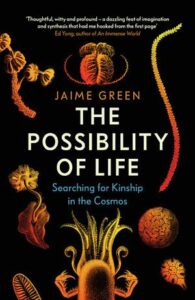 The Possibility of Life, Jaime Green
The Possibility of Life, Jaime Green
The Possibility of Life looks to both science and science fiction for an idea of humanity’s hopes, dreams and fears of what alien life might look like, how realistic that might be, and what it’s based on. If you’re an SF/F fan, you’ll probably recognise a lot of the references, and not just the old white men or the hit TV series of SF either: Ursula Le Guin and N.K. Jemisin are here too.
I found it very readable, and thought Green presents the scientific facts (such as they are) very well. The enthusiasm for the subject is palpable, and optimistic, but doesn’t over-egg it (we’re probably not five minutes from meeting a Vulcan or Cardassian).
Nothing too surprising for me, but I enjoyed the approach to the subject.
Rating: 4/5
Tags: book reviews, books, Jaime Green, non-fiction, science, SF/F
Posted September 10, 2023 by Nicky in Reviews / 1 Comment
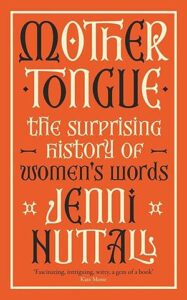 Mother Tongue, Jenni Nuttall
Mother Tongue, Jenni Nuttall
I was worried this would come off rather gender essentialist, and there were a few points that did raise eyebrows — Nuttall is very certain of her “we” when referring to various experiences that she attributes to “being female”, and though she didn’t say anything outright trans/enby-phobic, I was conscious that there was kind of a miasma of scepticism about the increase in gender-neutral language.
There was a lot of interesting stuff in here, but I found her style a bit tedious, and at times she really wasn’t clear. For example, she talked about the Latin version of the Bible and made it sound almost like it was originally written in Latin (it wasn’t). I’m pretty sure that’s because she was talking about a translation being done from Latin to the vernacular, with the translators using the Latin instead of the original, but… mm. It just all felt a little woolly to someone who was noticing what was said. There’s simplifying it for a lay audience, and there’s making it sound like the original version of the New Testament was in Latin.
(This may of course be mostly my own reading, and if I read it again it’d seem perfectly clear. Maybe. But on first read, I raised my eyebrows. That suggests a lack of clarity!)
As far as notes go, they are very, very scanty. A whole chapter has two endnotes, for example. What are the sources for literally everything else? Who knows.
All in all, I’m inclined to suggest steering away from this one, now that I’ve sat down and thought it through. Unearthing the words female-bodied people have used about themselves is a worthy plan, but if a whole chapter has only two notes, then… nah.
Rating: 2/5
Tags: book reviews, books, history, non-fiction
Posted September 8, 2023 by Nicky in Reviews / 0 Comments
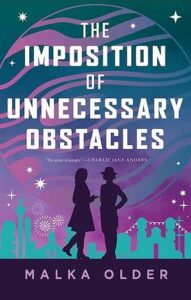 The Imposition of Unnecessary Obstacles, Malka Older
The Imposition of Unnecessary Obstacles, Malka Older
Recieved to review via Netgalley
It’s pure chance that I’d so recently read The Mimicking of Known Successes, but it definitely made me eager to read this follow-up. The setup continues rather Holmesian, but set on a planet full of dangers, not quite hospitable to humans, on which humanity has nonetheless made a home in a series of settlements joined by rails. Mossa is an investigator, looking into a disappearance — and Pleiti is her girlfriend.
The previous story’s shadow lingers here, with Pleiti definitely upset by her experiences, her worldview shaken, and with people around her a little wary and doubtful given her involvement in what happened. Mossa remains… well, Mossa, but her care for Pleiti shows in so many ways. I really enjoy their relationship: Pleiti has to guess a little at whether Mossa’s gestures are significant, is maybe over-reading significance into some things (and underestimating others); their relationship isn’t quite stable yet, but nonetheless, their careful attitude to it and to each other, carefully building things up, is enjoyable.
The mystery itself is less gripping to me: I enjoy it as a vehicle for understanding the world better, for seeing Mossa and Pleiti together, but any mystery would do, for that. The solution was actually a little obvious, when it came, but it was the getting there that mattered.
I enjoyed this a lot, and eagerly look forward to more novellas centring these two.
Rating: 4/5
Tags: book reviews, books, Malka Older, mystery, SF/F
Posted September 5, 2023 by Nicky in Reviews / 0 Comments
 The Wheel Spins, Ethel Lina White
The Wheel Spins, Ethel Lina White
Reading Ethel Lina White’s short stories, they seemed very sensational. From what Edwards writes in his introductions, the “woman in danger” story like this seemed to be her forté, but the short stories didn’t quite work for me, so I wasn’t sure whether this would be enjoyable. I was pleasantly surprised: I did find it a bit challenging in a way to read a book where a woman’s reality gets so constantly questioned, but it’s not that the situation was uninteresting in any way.
In the end, it’s a pretty simple trick (which I won’t ruin by discussing it at length), and we have all the clues for a long time. What matters is the suspense, and Iris’ understanding of the situation — and her fear and discomfort as it proves impossible to convince other people of what she knows to be true.
All of that feels especially poignant set against the asides, with Miss Froy’s family awaiting her safe return. The detail there is loving and tender, and that little family feels very real despite appearing only in a couple of chapters.
The main sour note for me is that a certain character reaps his rewards despite working against Iris and treating her as a helpless, hysterical woman. Get a better man, Iris!
Rating: 4/5
Tags: book reviews, books, British Library Crime Classics, crime, Ethel Lina White, mystery
Posted September 3, 2023 by Nicky in Reviews / 0 Comments
 An Immense World, Ed Yong
An Immense World, Ed Yong
I remember really liking Yong’s previous book about microbes, and this didn’t disappoint — despite being a whole new topic! The best pop-science, for me, is the stuff that makes me constantly want to tell someone about the neat things I’m learning. That was definitely the case here: I was texting my mum from the discharge ward after a minor surgery to tell her about the eyes of scallops!
Yong writes clearly and with lots and lots of examples. Now and then I didn’t care much for the metaphors, as in the introduction — just get down to the actual science, pleeeease. I also got a bit overloaded by all the footnotes. But for the most part, it was really readable and fascinating. There are a lot of references and so on in the back, and Yong is careful not to claim too much for any fascinating theories, making it clear when things are fully understood and when they aren’t. (At least, to the best of our knowledge.)
Animal senses really aren’t my main interest, but Yong writes engagingly enough — and the topic is fascinating enough — that it really doesn’t matter.
Definitely recommended, if your interest is piqued.
Rating: 5/5
Tags: book reviews, books, Ed Yong, non-fiction, science
Posted September 1, 2023 by Nicky in Reviews / 0 Comments
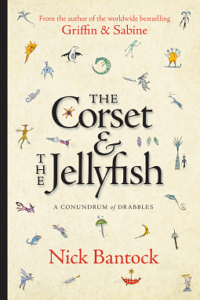 The Corset & The Jellyfish, Nick Bantock
The Corset & The Jellyfish, Nick Bantock
Received to review via Netgalley
I loved Nick Bantock’s Griffin & Sabine trilogy, though I haven’t read the follow-ups, so of course I was intrigued by the sound of this when I saw it come up in Netgalley. It’s a collection of microfiction, but it offers a challenge as well: there’s a link between these drabbles, if you’re dedicated enough to seek it out.
I wasn’t, I must confess: in ebook form, and reading on my desktop so I could see the images in colour, it just wasn’t comfortable/fun to try to flick back and forth. I’ll be eager to see what other people make of the mystery.
For the stories themselves, I’m not entirely certain what I think. On the one hand, I’m very picky about my microfiction, and these didn’t quite grab me. On the other hand, something about them got under my skin and made me want to get back to writing some microfiction of my own — and that usually happens when something a little bit magical is happening. I wonder if this is a collection that will grow on me — especially when wiser heads solve the mysteries of the links between stories.
Rating: 4/5
Tags: book reviews, books, Nick Bantock











